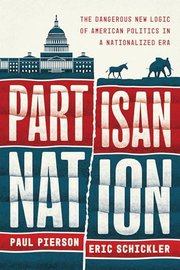Noted political scientists Pierson, author of Winner-Take-All Politics, and Schickler, author of Racial Realignment, draw on their extensive scholarship to examine various periods of American history during which polarization was particularly virulent, yet held largely in check until the 1960s by the regional diversity of political mechanisms and institutions of state political parties, media, and lobbying groups. The authors attempt to show how and why this dynamic shifted to the national state and why such polarization has caused the recent spate of U.S. presidential elections to take on nearly Armageddon-like overtones, amplified by both major parties. “Partisan rancor has become a defining feature of American politics,” they write. “Growing numbers regard the other party with hostility and fear. Party elites are more polarized still.” The authors contend that the Constitution—which they view from a “Madisonian” angle—was not designed to meet contemporary political difficulties and that the contemporary Republican Party, especially the segment that follows any order from Donald Trump, exploits the founding document’s vulnerabilities. The book is well researched, and the authors’ analysis of past eras of polarization changes in what they label “intermediary institutions” such as interest groups and mass media is incisive. However, the heavy focus on the Republican Party, while cogent and often accurate, leaves the account deficient. Given their arguments throughout the book, the authors seem to operate under the flawed premise that the Democratic Party is merely slightly center-left, and they fail to fully explore the ramifications of specific dubious decisions by Democratic leaders. While the text is certainly worth reading and contemplating, particularly for the historical analysis of partisanship, it tells only half of the story.
Categories
PARTISAN NATION
